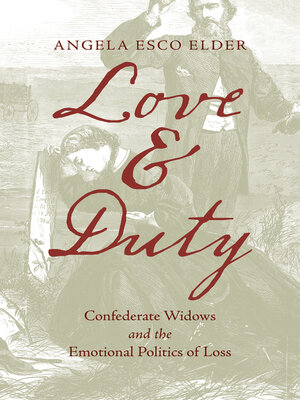Love and Duty
ebook ∣ Confederate Widows and the Emotional Politics of Loss · Civil War America
By Angela Esco Elder

Sign up to save your library
With an OverDrive account, you can save your favorite libraries for at-a-glance information about availability. Find out more about OverDrive accounts.
Find this title in Libby, the library reading app by OverDrive.



Search for a digital library with this title
Title found at these libraries:
| Library Name | Distance |
|---|---|
| Loading... |
Between 1861 and 1865, approximately 200,000 women were widowed by the deaths of Civil War soldiers. They recorded their experiences in diaries, letters, scrapbooks, and pension applications. In Love and Duty, Angela Esco Elder draws on these materials—as well as songs, literary works, and material objects like mourning gowns—to explore white Confederate widows’ stories, examining the records of their courtships, marriages, loves, and losses to understand their complicated relationship with the Confederate state. Elder shows how, in losing their husbands, many women acquired significant cultural capital, which positioned them as unlikely actors to gain political influence.
Confederate officialdom championed a particular image of white widowhood—the young wife who selflessly transferred her monogamous love from her dead husband to the deathless cause for which he’d fought. But a closer look reveals that these women spent their new cultural capital with great shrewdness and variety. Not only were they aware of the social status gained in widowhood; they also used that status on their own terms, turning mourning into a highly politicized act amid the battle to establish the Confederacy’s legitimacy. Death forced all Confederate widows to reconstruct their lives, but only some would choose to play a role in reconstructing the nation.
Confederate officialdom championed a particular image of white widowhood—the young wife who selflessly transferred her monogamous love from her dead husband to the deathless cause for which he’d fought. But a closer look reveals that these women spent their new cultural capital with great shrewdness and variety. Not only were they aware of the social status gained in widowhood; they also used that status on their own terms, turning mourning into a highly politicized act amid the battle to establish the Confederacy’s legitimacy. Death forced all Confederate widows to reconstruct their lives, but only some would choose to play a role in reconstructing the nation.







